Vainu Alternatives
This article compares Vainu with 10 alternatives. Get a detailed breakdown of sales intelligence tools to make an informed choice.
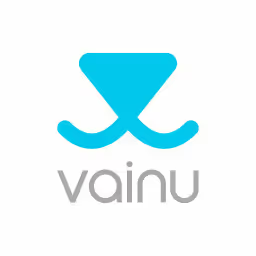
Vainu is a strong choice for many, especially for its detailed company data and excellent coverage in the Nordics. Teams often use it for its specific B2B database, which helps them find and focus on the right business opportunities in that market.
But like any tool, it has limits. Some users report missing contact data or less information on smaller companies. We've analyzed the best alternatives based on G2 reviews, comparing their strengths and weaknesses to Vainu to help you create a shortlist. Let's get started.
Automate Sales with 11x Digital Workers
If your team wants to automate sales tasks, consider digital workers. 11x provides autonomous agents to handle parts of the sales process, from research to outreach. This lets your team focus on deal closure and can supplement your existing sales efforts.
11x is a GTM platform that uses AI agents to manage the sales process. An agent named Alice finds prospects, conducts outreach on email and LinkedIn, and updates your CRM. Julian, another agent, qualifies inbound leads and books meetings.
The platform unifies data enrichment, outreach, and email warmup functions. This approach can replace the need for multiple point solutions within a GTM stack.
Vainu Alternatives
Below, we review several Vainu alternatives in detail. Each review covers pricing, main features, and how they compare to Vainu in terms of advantages and drawbacks.
1) ZoomInfo SalesOS
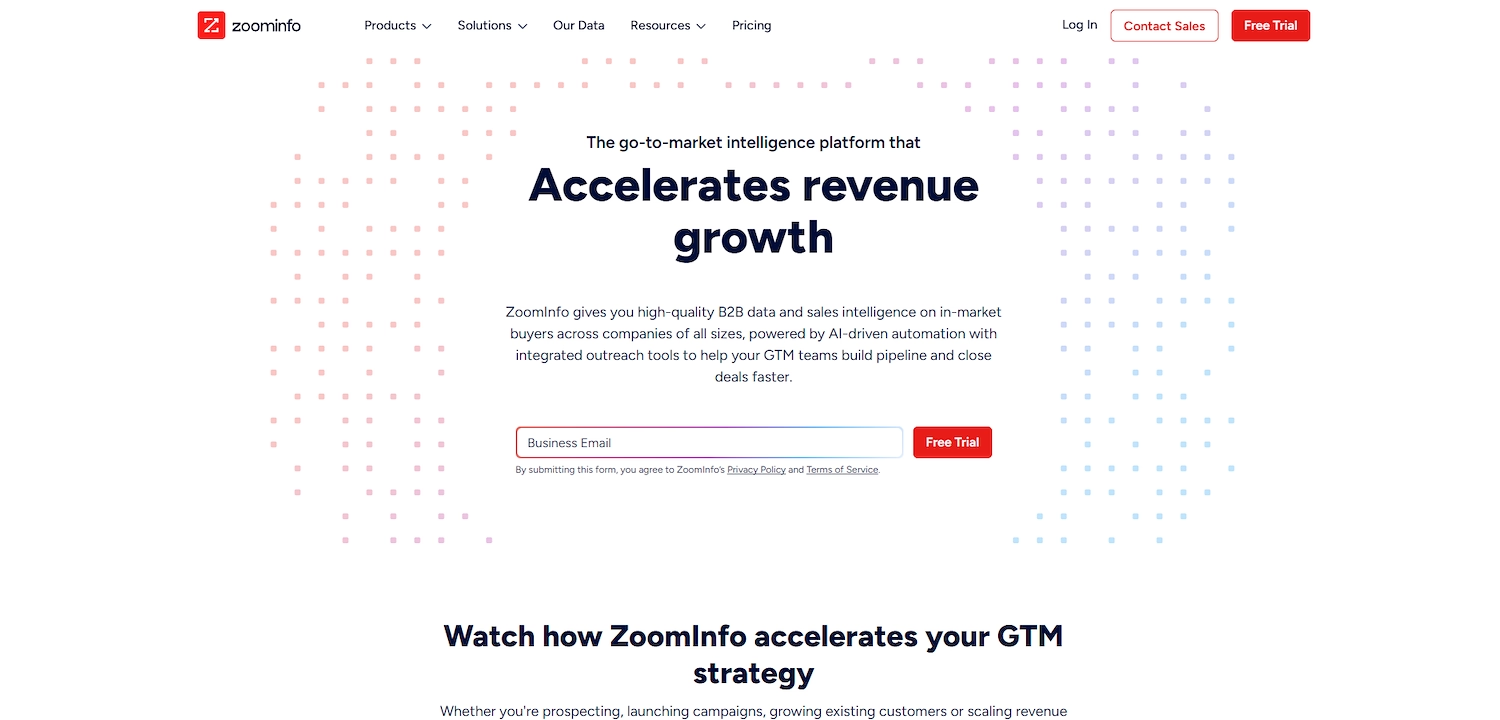
ZoomInfo SalesOS is a go-to-market intelligence platform for B2B organizations. It offers a database with company and contact information to help teams identify and connect with potential buyers. The system unifies this data with buyer-intent signals and engagement tools.
Users can build prioritized lead lists with verified contact details and find accounts that are in-market. It acts as a central data source for sales and marketing teams.
ZoomInfo SalesOS's Main Features
- Uses a generative-AI companion, Copilot, to surface insights and draft outreach materials.
- Analyzes call and meeting interactions with its conversation intelligence tool, Chorus.
- Turns anonymous website page views into leads with visitor tracking and engages them through a real-time website chat function.
- Creates and targets tailor-made audiences for digital advertising campaigns.
How ZoomInfo SalesOS Compares to Vainu
Average Review Score: 4.5/5 stars based on 8,738 G2 reviews.
- ZoomInfo SalesOS includes an AI assistant, Copilot, that provides insights and drafts outreach materials. This is a feature not found in Vainu, which focuses more on providing company data.
- The platform offers a conversation intelligence tool, Chorus, to analyze sales calls. This capability extends beyond Vainu's core function as a company database.
- It identifies anonymous website visitors and provides a real-time chat function to engage them. This lead generation method is different from Vainu's approach of building prospect lists from its database.
- This tool integrates sales engagement features for outreach. In contrast, Vainu primarily serves as a data source that often requires separate tools for sales execution.
Where ZoomInfo SalesOS Differs From Vainu
- ZoomInfo SalesOS offers broad global data, but its coverage in the Nordic region can be less comprehensive compared to Vainu's specialized database for that market.
- The tool bundles many features like sales engagement and intent data, which might be more than a team needs if the main goal is simple company prospecting, a core strength of Vainu.
- Some users report that its extensive database can sometimes contain outdated or inaccurate contact information, whereas Vainu's more focused approach may offer greater precision within its niche.
Pricing and Cost-Effectiveness
Vainu provides transparent annual plans, with its Nordic Team package starting at €4,200 per year. In contrast, ZoomInfo SalesOS does not publish its pricing, offering custom quotes based on a team's specific needs for its more extensive, all-in-one platform.
2) Apollo.io
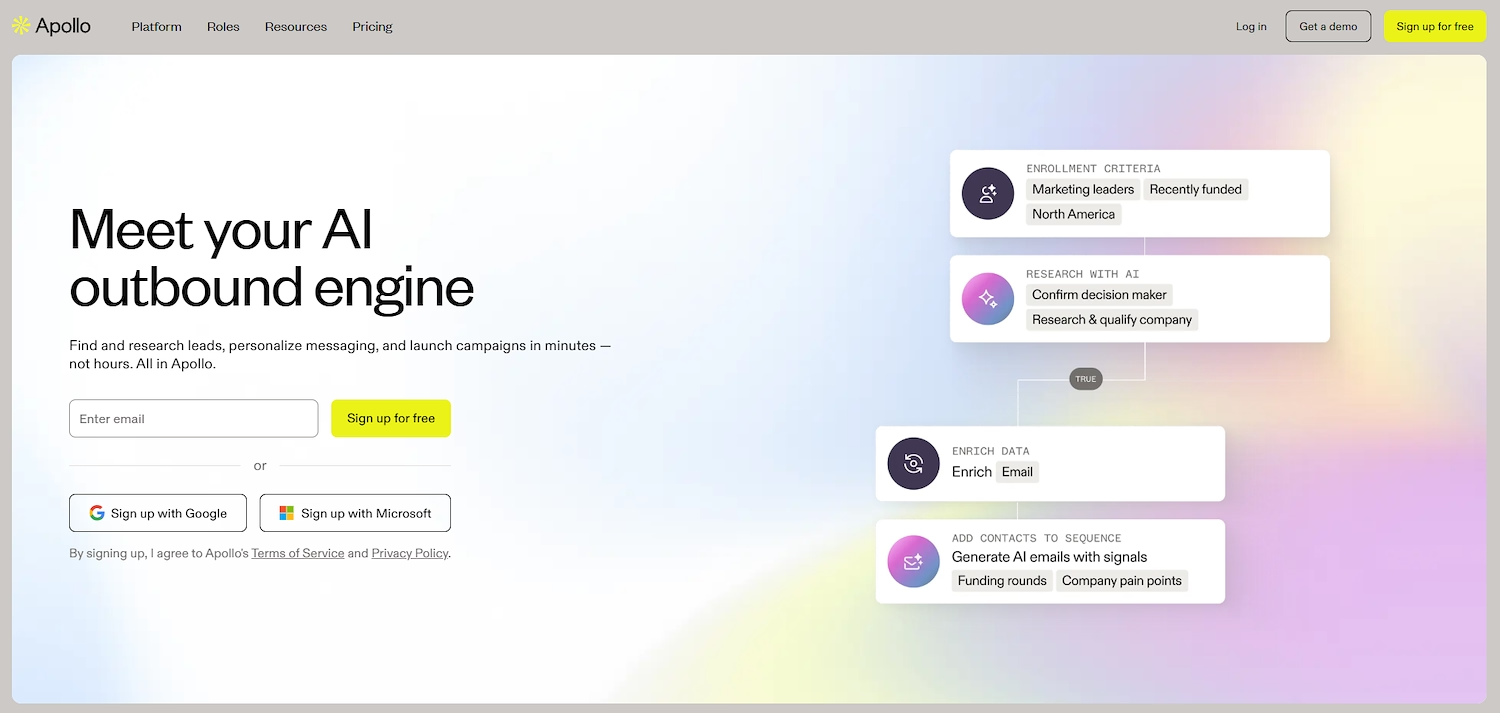
Apollo.io is a sales platform that combines a B2B database with engagement tools. Users can search for contacts and companies, then use the platform to execute outreach sequences. It supports sales workflows with data, search filters, and automation features for tasks like email and call campaigns.
Apollo.io's Main Features
- Automates outreach with a sequencing engine for personalized email and call campaigns.
- Integrates a B2B database with built-in engagement tools to manage workflows in a single platform.
- Provides advanced search filters to find specific contacts and companies within its database.
How Apollo.io Compares to Vainu
Average Review Score: 4.7/5 stars based on 8,904 G2 reviews.
- Apollo.io provides an all-in-one platform with a database and engagement tools. This differs from Vainu, which is a company data source that often needs separate tools for outreach.
- The tool includes a free plan, which allows teams to try its features before they commit. In contrast, Vainu's pricing starts with an annual plan that requires an upfront investment.
- Its Intelligence Engine offers AI-driven recommendations to help sales teams with deal closure. This feature provides predictive insights, unlike Vainu, which focuses on static company data for prospecting.
- The platform's database contains over 210 million contacts for extensive global coverage. This scale is broader compared to Vainu, which specializes in deep company information primarily for the Nordic region.
Where Apollo.io Differs From Vainu
- Apollo.io's data is global, which sometimes means it has less detailed company information for the Nordic region. Vainu, in comparison, offers specialized and in-depth data specifically for that market.
- Some users find that the vastness of its database can lead to occasional data inaccuracies. Vainu's more concentrated focus on specific markets may result in more precise information within its area of expertise.
- The tool combines many features for sales engagement. This might be more than a team requires if their main goal is simple company prospecting, which is a core function of Vainu.
Pricing and Cost-Effectiveness
Vainu requires an annual commitment, with its Nordic Team plan starting at €4,200 per year. In contrast, Apollo.io offers a free plan and paid options starting at $49 per user per month, making it a more flexible and accessible choice for smaller teams. For a full breakdown, check the detailed pricing on Apollo.io's official website.
3) Clearbit
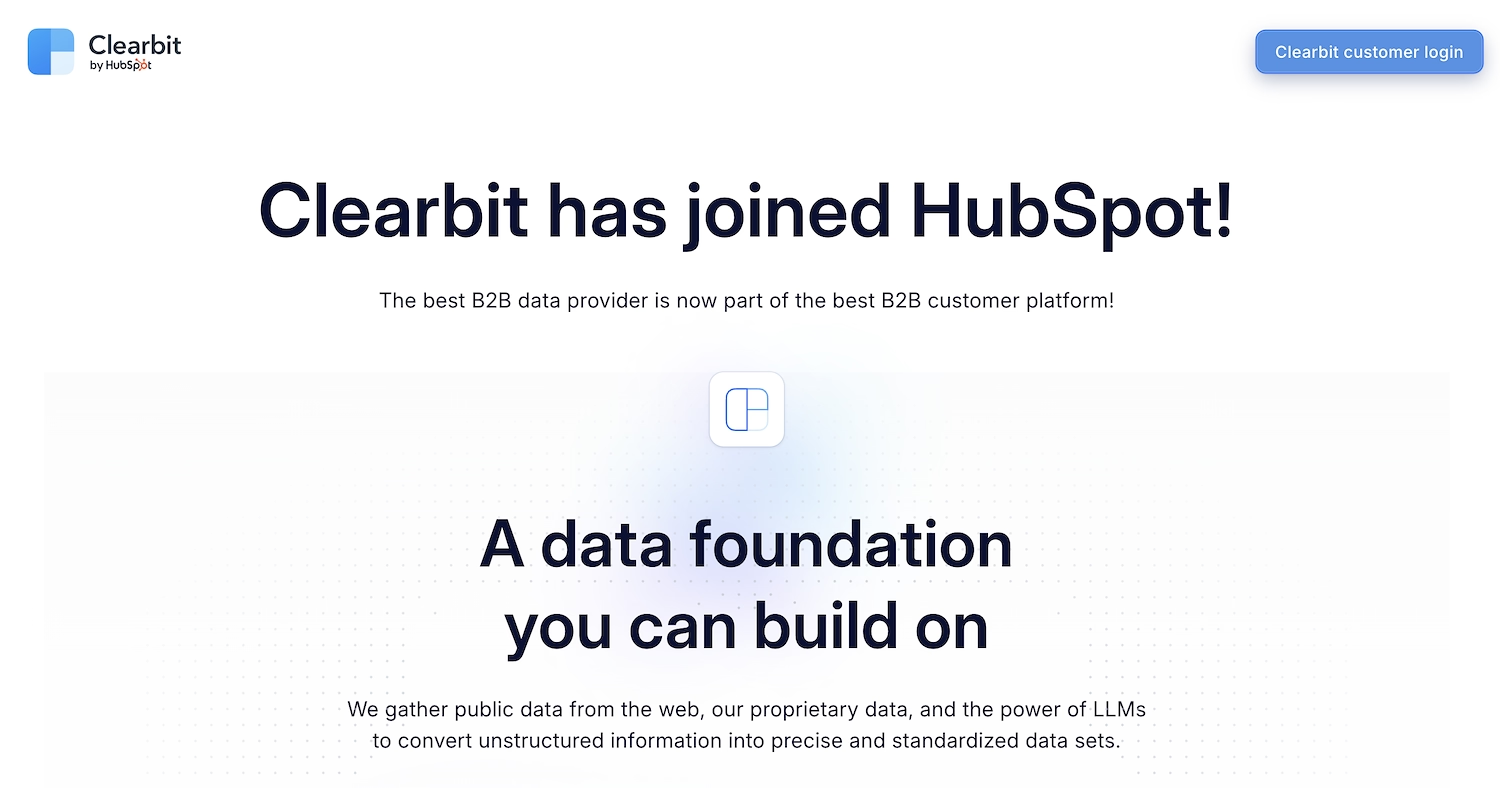
Clearbit, now part of HubSpot, acts as a data layer for B2B teams. It gathers public and proprietary data, using LLM techniques to build standardized datasets. The service provides global company and contact information to enrich CRM records and qualify leads in real time.
Teams also use it to identify anonymous website visitors, which helps power marketing and sales initiatives within HubSpot.
Clearbit's Main Features
- Aggregates public and proprietary data using LLM techniques to create standardized B2B datasets for global use.
- Enriches records with firmographic and demographic details to provide a more complete view of leads, contacts, and accounts.
- Identifies anonymous website visitors that match an ideal customer profile and surfaces them in a visitor dashboard for outbound teams.
- Shortens web forms by removing fields that can be automatically enriched, which helps reduce friction and increase conversion rates.
How Clearbit Compares to Vainu
Average Review Score: 4.4/5 stars based on 626 G2 reviews.
- Clearbit enriches existing CRM records with over 100 data points. This differs from Vainu, which acts as a separate database for building new prospect lists.
- The tool identifies anonymous website visitors that match an ideal customer profile. In contrast, Vainu finds new companies from its database, not from website traffic.
- It shortens website forms by automatically adding company information, a feature designed to increase lead conversion rates that is not present in Vainu.
- The platform integrates directly into HubSpot to automate workflows. This provides a different experience compared to Vainu, which operates as a standalone application.
Where Clearbit Differs From Vainu
- Clearbit provides global data, which can sometimes mean its information on Nordic companies is less detailed compared to Vainu's specialized focus on that market.
- The tool primarily enriches existing data within a CRM and is not designed as a standalone prospecting platform. In contrast, Vainu lets teams build new prospect lists from scratch.
- Some users report that its broad dataset can occasionally contain outdated contact information, whereas Vainu's more concentrated approach may offer greater precision within its niche.
Pricing and Cost-Effectiveness
While Vainu offers transparent annual plans starting at €4,200, Clearbit uses a custom quote model and does not publish its pricing. This makes Vainu's costs more predictable, whereas Clearbit's pricing is tailored to specific usage. For an exact quote, visit Clearbit's official website.
4) D&B Hoovers

D&B Hoovers offers a sales intelligence platform centered on its B2B database. The service provides company and contact data to help sales teams find new opportunities and target the right accounts. It is a resource for go-to-market strategies, with information to support prospect research and list creation.
D&B Hoovers's Main Features
- Uses the Dun & Bradstreet D-U-N-S Number to provide a standardized identifier for businesses in its database.
- Maps corporate family trees to show relationships between parent companies and their subsidiaries.
- Identifies in-market accounts with intent data and alerts users to trigger events like funding rounds or executive changes.
- Builds dynamic and static lists with filters for criteria such as industry, company size, and technology stack.
How D&B Hoovers Compares to Vainu
Average Review Score: 4.1/5 stars based on 717 G2 reviews.
- D&B Hoovers uses the D-U-N-S Number for standardized business identification. This offers a global data structure, whereas Vainu provides deep company data primarily for the Nordic market.
- The platform maps corporate family trees to show relationships between parent companies and subsidiaries. This feature offers a view of corporate structures that is more detailed than Vainu's company profiles.
- It identifies accounts with intent data and sends alerts for trigger events like funding rounds. This is a dynamic approach to prospecting, while Vainu serves more as a database for building static lists.
- Users get access to analyst research and industry forecasts. This provides market context that is not a primary feature of Vainu's company data platform.
Where D&B Hoovers Differs From Vainu
- D&B Hoovers provides a massive global database, but this can mean its data on Nordic companies is less detailed. Vainu, by contrast, specializes in that region, often offering more precise and localized information.
- Some users find that the platform's vast amount of data can sometimes be outdated. Vainu's more concentrated focus on specific markets may result in more current information within its area of expertise.
- The tool is very comprehensive, which might be too complex for teams that just need to build prospect lists. Vainu offers a simpler, more direct solution for that specific task.
Pricing and Cost-Effectiveness
Vainu offers transparent annual plans starting at €4,200, which provides cost predictability. In contrast, D&B Hoovers uses a custom quote model and does not publish its pricing. Check the detailed pricing of D&B Hoovers on D&B Hoovers's official website.
5) Lusha
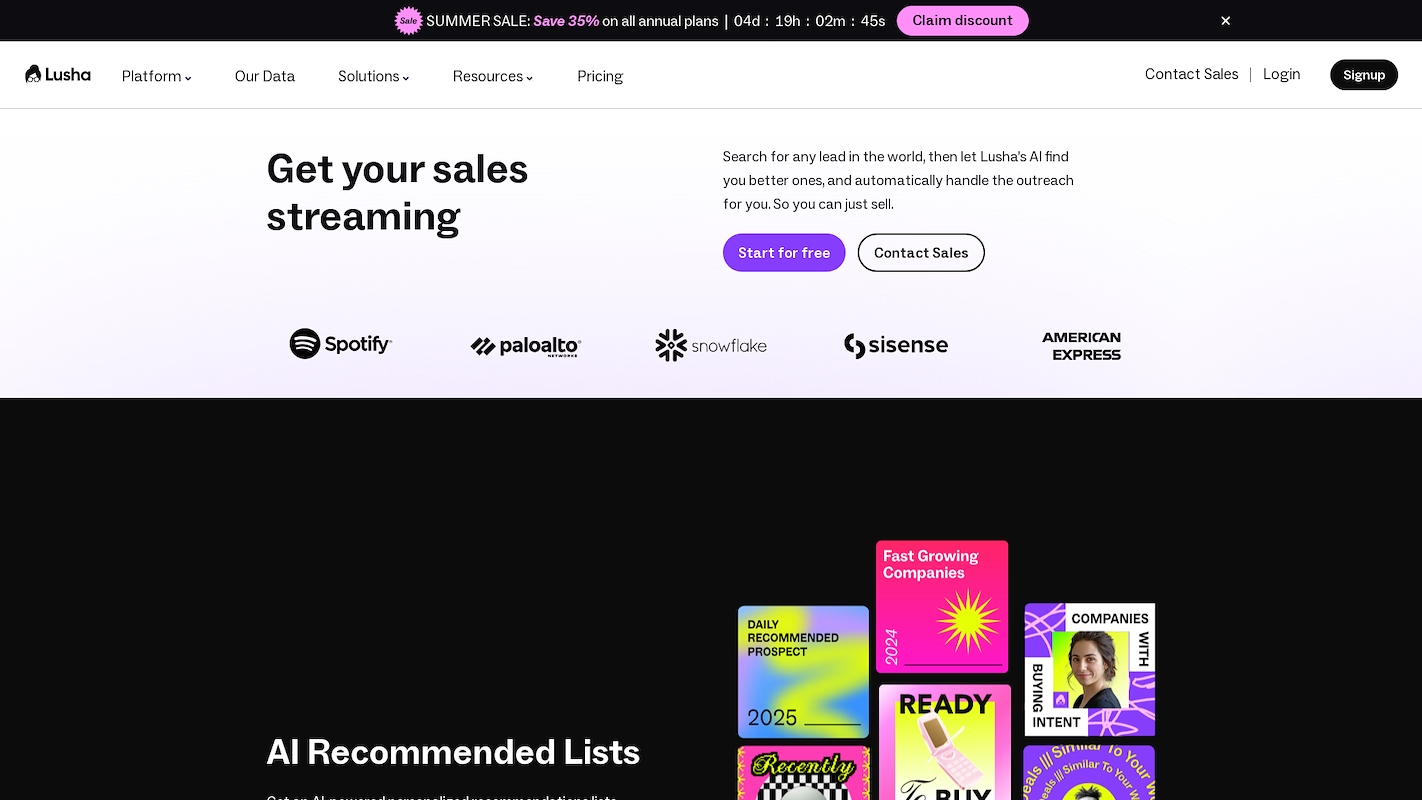
Lusha is a sales intelligence platform with a B2B database for contact and company information. Sales teams use the tool to access direct-dial phone numbers and verified email addresses for prospects. It supports the creation of outreach lists and the enrichment of CRM data.
Lusha's Main Features
- Records and analyzes sales meetings with its conversation intelligence tool, Lusha Conversations.
- Automates and personalizes email sequences using AI-generated copy.
- Generates live, auto-updating lead lists that add new prospects at set intervals.
- Captures contact data directly from LinkedIn and company websites through a browser extension.
How Lusha Compares to Vainu
Average Review Score: 4.3/5 stars based on 1,516 G2 reviews.
- Lusha offers a browser extension to capture contact data directly from LinkedIn and company websites. This provides a different workflow compared to Vainu, which operates as a standalone search platform.
- The platform focuses on providing direct-dial phone numbers and verified email addresses. This is a more granular approach to contact data than Vainu’s primary focus on company-level information.
- It generates live, auto-updating lead lists based on a user's ideal customer profile. This automated method contrasts with Vainu, where users typically build static prospect lists.
- A free plan is available for teams to test the platform's features. In contrast, Vainu requires an annual commitment, which is a larger upfront investment.
Where Lusha Differs From Vainu
- Lusha’s global database can sometimes offer less detailed information on Nordic companies, unlike Vainu, which specializes in that specific market.
- The platform focuses on providing contact details like phone numbers. In contrast, Vainu offers deeper company-level data for strategic account planning.
- Some users find its data is more suited for direct outreach than for complex market analysis, a core strength of Vainu's company intelligence platform.
Pricing and Cost-Effectiveness
Vainu requires an annual commitment, with plans starting at €4,200 per year. In contrast, Lusha offers greater flexibility with a free plan and paid options starting at $36 per user per month, making it more accessible for smaller teams. For detailed pricing, visit Lusha's official website.
Automate Sales Efforts with 11x
If your team wants to automate sales tasks, 11x offers digital workers to manage prospecting and outreach. This approach allows your sales team to focus on closing deals instead of manual GTM activities.
The platform provides AI agents that can supplement your existing sales stack or replace multiple point solutions. To see how digital workers can fit into your process, consider exploring what 11x offers.
With 11x, we run your sales playbook from start to finish. Our agent Alice finds accounts, enriches their data, and manages outreach. Julian handles calls, qualifies leads, and schedules meetings. The platform combines intent signals and email warmup, replacing multiple tools in your GTM stack.
Book a demo to see how it works.
6) Cognism
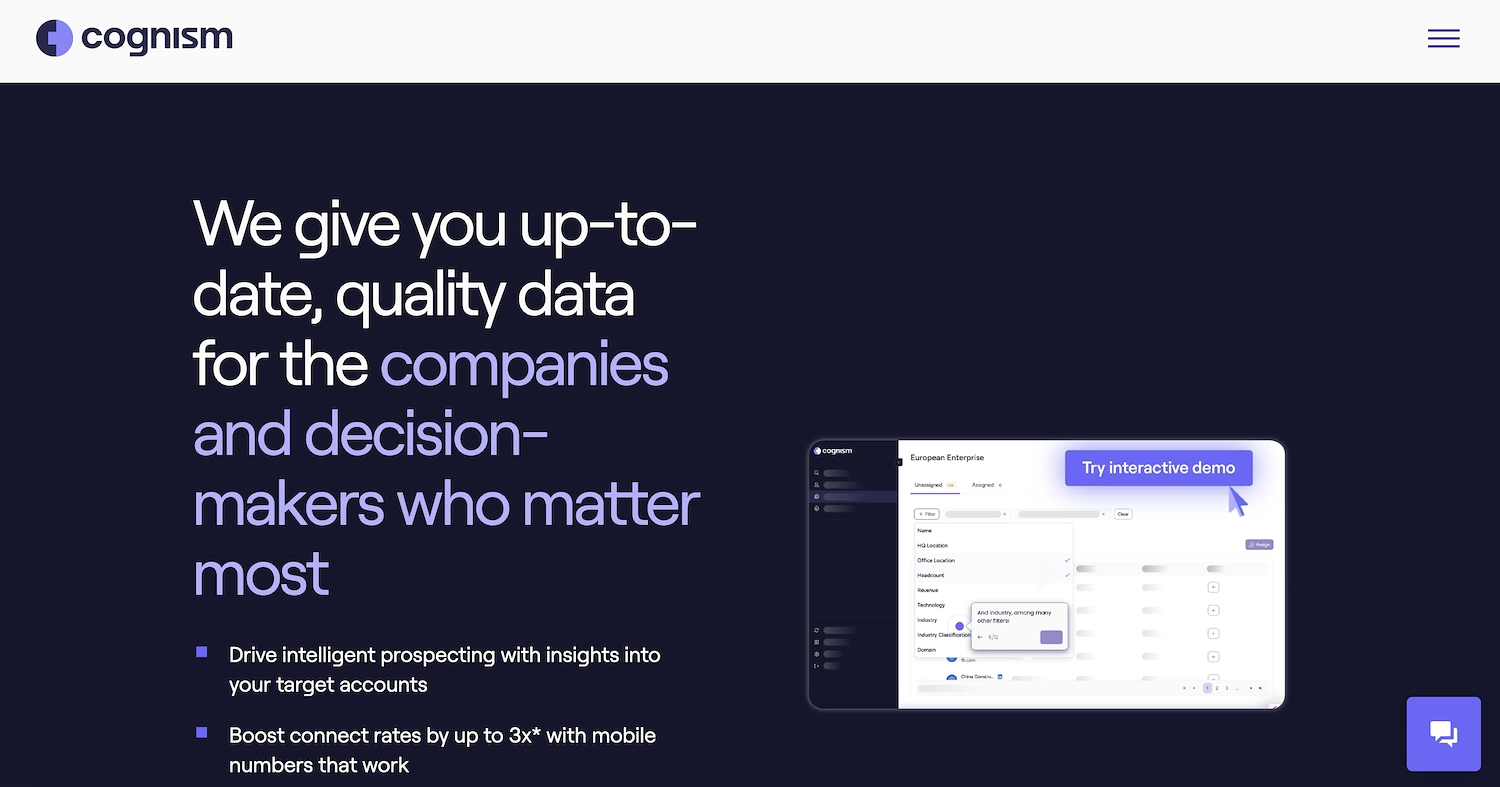
Cognism is a sales intelligence platform that offers a global B2B database for sales and marketing teams. The service provides verified contact information, such as mobile numbers and email addresses, to help users connect with prospects.
Teams use the tool to build targeted account lists and enrich their CRM data, which supports their go-to-market strategies.
Cognism's Main Features
- Provides phone-verified mobile numbers, known as Diamond Data®, to help increase connection rates.
- Surfaces buying signals from hiring trends, funding rounds, and technographic changes for timely outreach.
- Enriches CRM records in bulk through CSV or API to complete and refresh existing data.
- Offers a browser extension, Sales Companion, to prospect directly from LinkedIn and corporate websites.
How Cognism Compares To Vainu
Average Review Score: 4.6/5 stars based on 1,033 G2 reviews.
- Cognism provides phone-verified mobile numbers, known as Diamond Data®, for higher connection rates. This focus on contact-level accuracy differs from Vainu's emphasis on company-level data.
- It offers strong B2B data for the broader European market. This gives it a wider geographic scope compared to Vainu's specialized focus on the Nordic region.
- The tool identifies buying signals like hiring trends and funding rounds for timely outreach. This is a dynamic approach, while Vainu is more for building static prospect lists.
- Its browser extension lets users find contact data on websites and LinkedIn. This workflow is different from Vainu, which operates as a standalone search platform.
Where Cognism Differs From Vainu
- Cognism offers broad European data, but its information on Nordic companies can sometimes be less detailed compared to Vainu's specialized database for that region.
- The platform focuses heavily on contact-level details like mobile numbers. This approach differs from Vainu, which provides deeper company intelligence for strategic account planning.
- Some users report that its extensive database can occasionally contain outdated information. In contrast, Vainu's focused approach on a specific market may result in more current data.
Pricing and Cost-Effectiveness
Vainu offers transparent annual plans starting at €4,200 per year, which provides cost predictability. In contrast, Cognism uses a custom quote model and does not publish its pricing, tailoring costs to a team's specific needs. For a detailed quote, visit Cognism's official website.
7) Dealfront
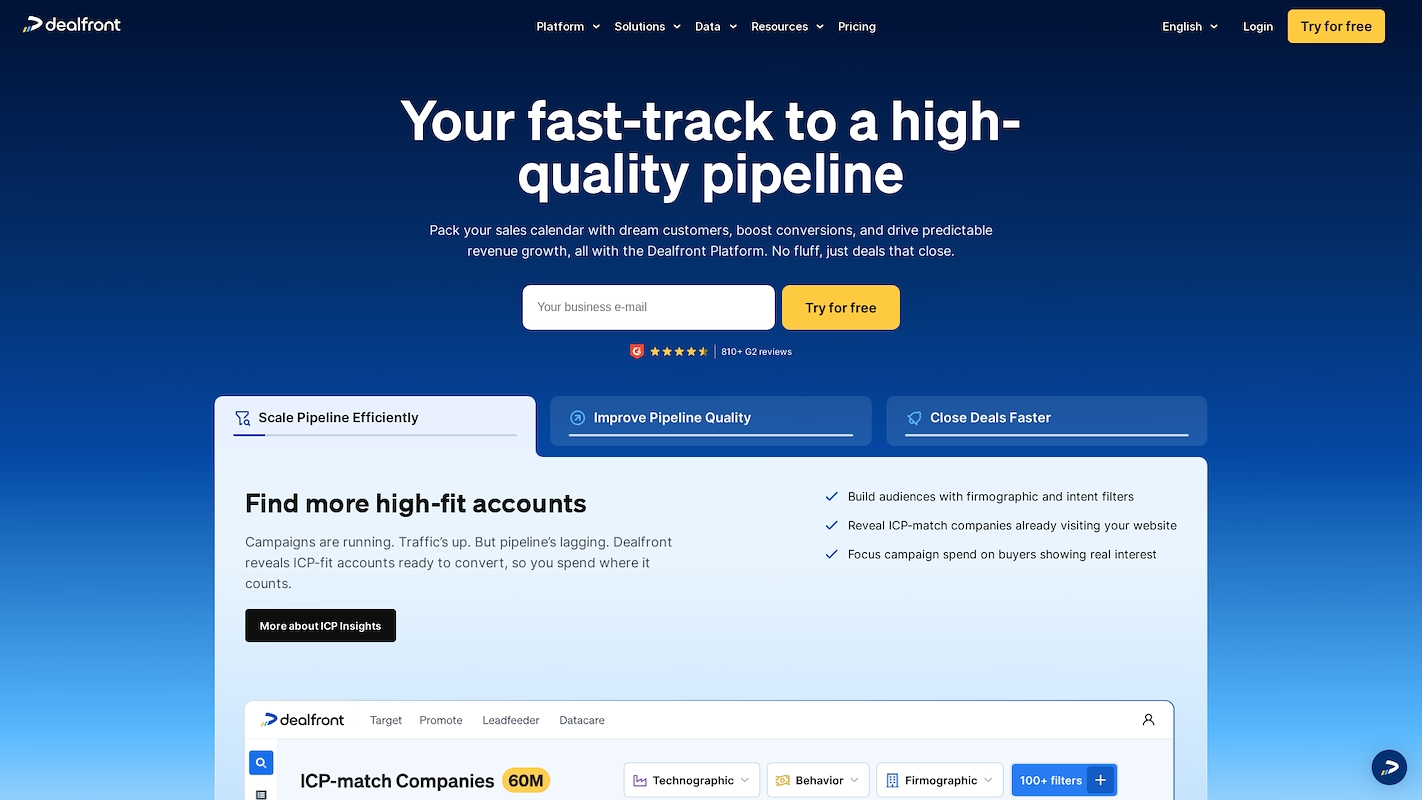
Dealfront is a go-to-market platform built around a B2B database. It provides company and contact data to help sales teams find prospects and build account lists. Teams use the platform for prospect research and to gather intelligence for their outreach efforts.
Dealfront's Main Features
- Identifies companies visiting a website and segments them based on an ideal customer profile.
- Runs targeted B2B display advertising campaigns to reach specific accounts.
- Cleanses, enriches, and optimizes existing company data within a CRM using its Datacare module.
- Uses over 40 real-time buying-intent signals to help teams focus on active prospects.
How Dealfront Compares to Vainu
Average Review Score: 4.5/5 stars based on 111 G2 reviews.
- Dealfront identifies anonymous companies that visit a user's website, which provides a source of warm leads. Vainu, in contrast, is used to build prospect lists from its database, not from website traffic.
- It uses over 40 real-time buying-intent signals to help teams find active prospects. This approach is more dynamic compared to Vainu, which primarily provides company data for building static lists.
- The platform allows users to run targeted B2B display advertising campaigns to reach specific accounts. This is a marketing function not found in Vainu, which serves as a company intelligence tool.
- The tool includes a module to cleanse and enrich existing CRM data. This differs from Vainu, which primarily functions as a separate platform for building new prospect lists.
Where Dealfront Differs From Vainu
- Dealfront has strong European data, but its focus is wider than Vainu's. Vainu specializes entirely in the Nordic market, which may provide deeper, more localized company insights within that specific region.
- The platform is designed as a full go-to-market suite that includes lead generation from web traffic. In comparison, Vainu functions as a standalone company database, which can be a more direct tool for teams that build prospect lists from scratch.
- Some users note that its credit system for data exports can add a layer of management. Vainu's model, based on an annual plan, typically offers more straightforward access to its database without per-export limits.
Pricing and Cost-Effectiveness
Vainu offers transparent annual plans starting at €4,200, providing cost predictability. Dealfront uses a modular approach; its website visitor identification tool starts at €99 per month, while its main sales intelligence platform is quote-based. For an exact quote, visit Dealfront's official website.
8) Crunchbase
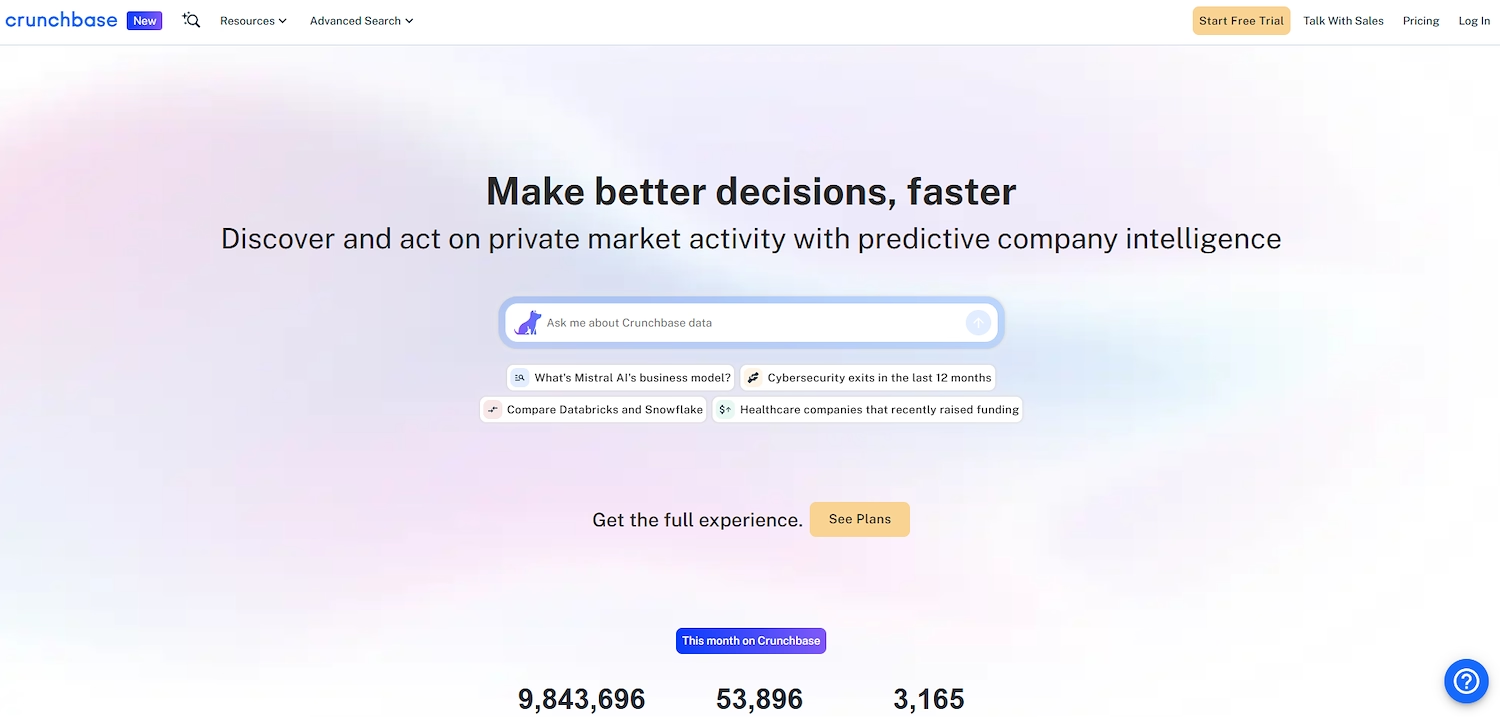
Crunchbase is a platform with business information on private and public companies. It is a source for data on investments, capital raises, and acquisitions.
Teams use the service for market research, to spot industry trends, and for due diligence on potential deals and partnerships.
Crunchbase's Main Features
- Provides industry research and intelligence on private companies, including funding data and market activity.
- Builds lead lists using AI-powered insights to surface high-potential startups for prospecting.
- Segments company data with advanced filters to support market analysis and investment research.
How Crunchbase Compares to Vainu
Average Review Score: 4.5/5 stars based on 377 G2 reviews.
- Crunchbase offers detailed information on funding rounds, investments, and acquisitions. This provides a financial view of companies, a different focus from Vainu's data on company operations for prospecting.
- The platform uses AI-powered insights to identify emerging startups and market trends. This predictive approach differs from Vainu, which provides a database for building prospect lists from current company data.
- It is often used for broader market research and tracking investment trends. This is a different application compared to Vainu, which is primarily a tool for building targeted sales prospect lists.
- Its database has a global scope, covering companies worldwide. This offers a broader reach for international prospecting, unlike Vainu's specialized and deep coverage of the Nordic market.
Where Crunchbase Differs From Vainu
- While Crunchbase covers companies worldwide, its data on the Nordic market can be less granular. Vainu specializes in this region, offering deeper insights into local businesses.
- The platform's data centers on funding, acquisitions, and investment trends. This focus differs from Vainu, which provides operational company details more suited for traditional sales prospecting.
- Its database is heavily weighted toward tech companies and startups. For users prospecting in more traditional industries, Vainu may offer more comprehensive coverage within its Nordic focus area.
Pricing and Cost-Effectiveness
Vainu's pricing is team-oriented, with annual plans starting at €4,200. Crunchbase offers a more granular, per-user model with its Pro plan available for $588 per year, making it more accessible for individual users.
9) UpLead
UpLead is a B2B data provider that offers contact and company information. Teams use it to build prospect lists and find verified email addresses and phone numbers for outreach. The platform emphasizes data accuracy with real-time verification.
UpLead's Main Features
- Offers a database with a 95% data accuracy guarantee, backed by real-time email verification.
- Provides detailed technographic data, showing the software and technologies a company uses.
- Includes a browser extension to capture contact information from LinkedIn and company websites.
- Identifies prospects with buying intent signals to help prioritize outreach efforts.
How UpLead Compares to Vainu
Average Review Score: 4.7/5 stars based on 1,881 G2 reviews.
- UpLead guarantees 95% data accuracy with real-time verification, which helps reduce email bounce rates. Vainu focuses more on providing deep company profiles for analysis.
- The platform offers a free trial and flexible monthly plans. This provides a lower entry barrier compared to Vainu's required annual commitment.
- It includes technographic data, which helps teams target companies based on their existing tech stack. This is a specific filter not central to Vainu's offering.
Where UpLead Differs From Vainu
- UpLead's global database may offer less granular information on Nordic companies. Vainu specializes in this region, providing more localized and in-depth data.
- The platform's primary function is contact acquisition for sales outreach. Vainu is more oriented toward strategic market research and company intelligence.
- Its credit-based system means users pay per export. This can be less predictable than Vainu's annual plan, which typically allows for broader data access.
Pricing and Cost-Effectiveness
Vainu has annual plans starting at €4,200. In contrast, UpLead offers a free trial and monthly plans starting at $74 per user. This makes it a more flexible option for teams that do not want a long-term commitment. For details, visit UpLead's official website.
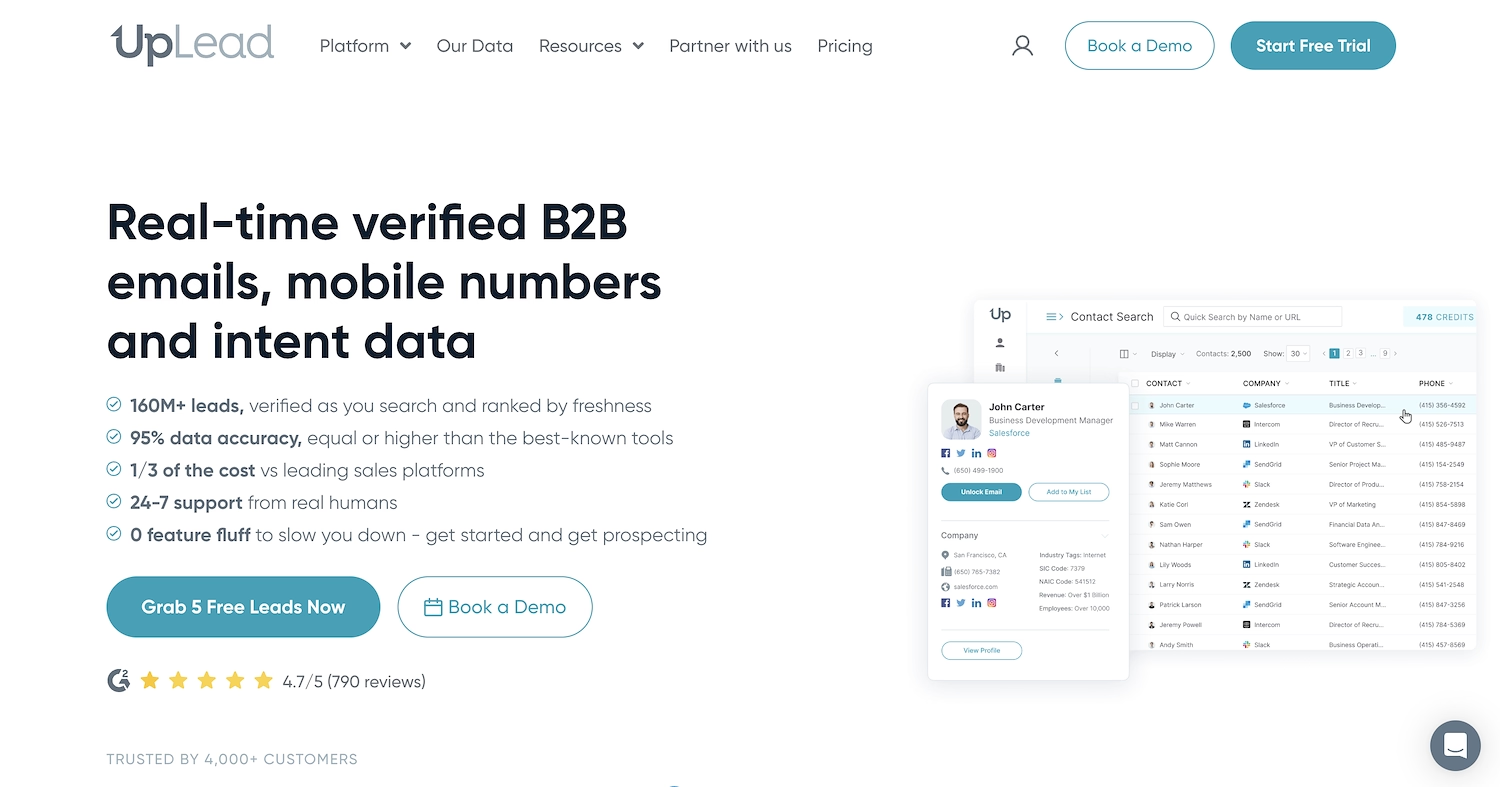
UpLead is a B2B data provider that supplies contact and company information. Teams use the platform to construct prospect lists with verified email addresses and phone numbers for outreach. The service emphasizes data accuracy, supported by real-time verification.
UpLead's Main Features
- Offers a database with a 95% data accuracy guarantee, backed by real-time email verification.
- Includes over 50 search filters and intent data to identify in-market buyers.
- Integrates with Salesforce, HubSpot, and other CRMs via Zapier to automate workflows.
- Cleans and enriches existing data to complete contact and company records within a CRM.
How UpLead Compares To Vainu
Average Review Score: 4.7/5 stars based on 797 G2 reviews.
- UpLead provides a 95% data accuracy guarantee with real-time email verification, which helps lower email bounce rates. Vainu, in comparison, focuses more on providing deep company profiles for strategic analysis.
- The platform offers a free trial and flexible monthly plans. This provides a lower entry barrier compared to Vainu's model, which requires an annual commitment.
- It includes detailed technographic data, which allows teams to target companies based on their current technology stack. This is a specific filter that is not a central feature in Vainu's platform.
- This tool identifies prospects with buying intent signals to help prioritize outreach efforts. This approach is more dynamic than Vainu's, which is primarily used to build static prospect lists.
Where UpLead Differs From Vainu
- UpLead's global database may offer less granular information on Nordic companies. Vainu specializes in this region, which often results in more localized and in-depth data for that specific market.
- The platform's primary function is contact acquisition for sales outreach. In contrast, Vainu is more oriented toward strategic market research and deep company intelligence.
- Its credit-based system means users pay per data export. This model can be less predictable for large-scale prospecting than Vainu's annual plan, which typically allows for broader data access.
Pricing and Cost-Effectiveness
Vainu has annual plans starting at €4,200, offering cost predictability for teams. In contrast, UpLead provides a free trial and monthly plans starting at $99. This makes UpLead a more flexible option for smaller teams or those who want to avoid a long-term commitment.
10) Seamless.ai
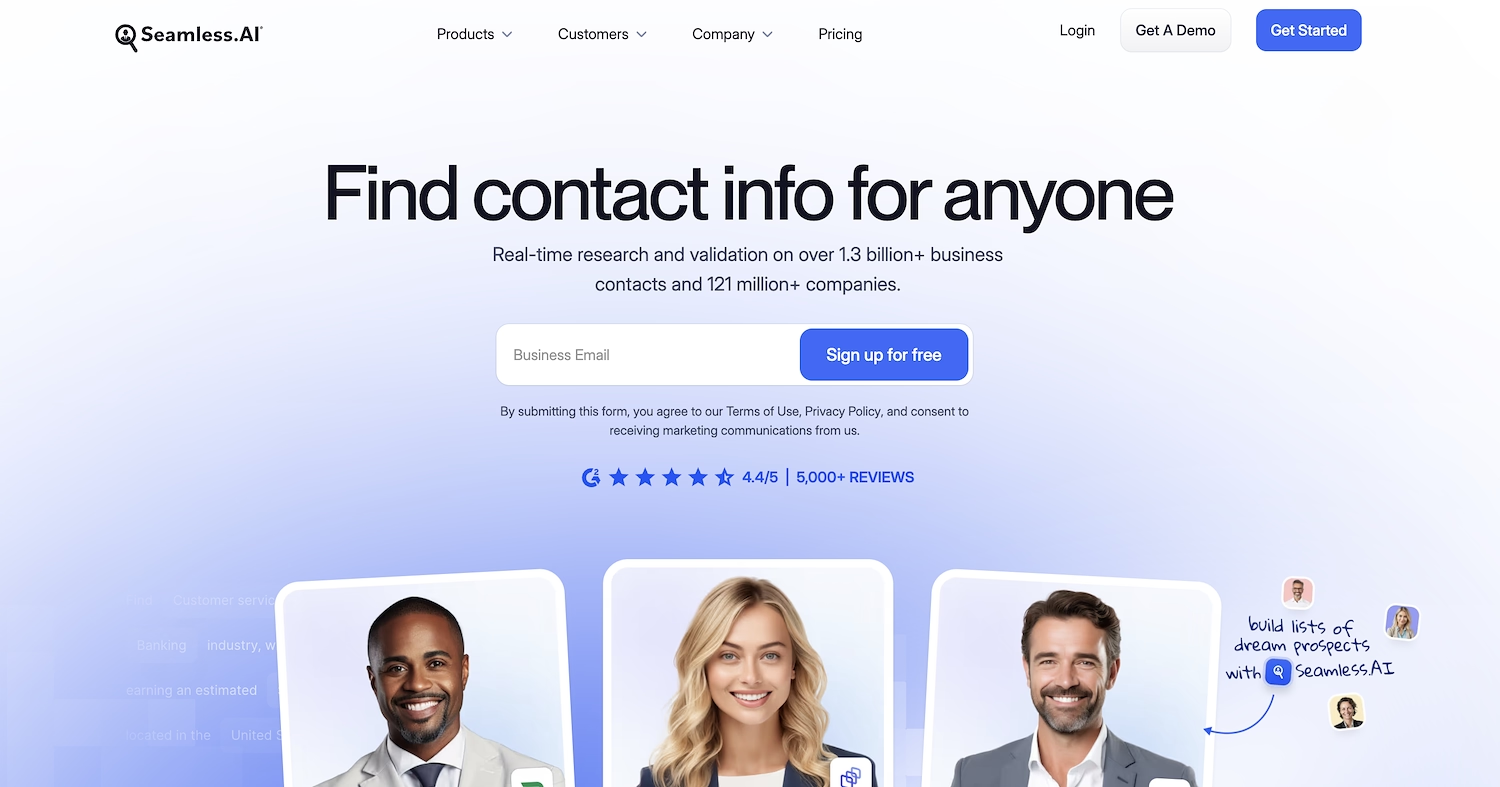
Seamless.ai operates as a real-time search engine for B2B data. The platform helps sales teams find verified cell phones, emails, and direct dials for contacts at their target accounts. Its AI-powered engine locates and validates information across the web in real time. This provides fresh data for list creation and direct outreach to connect with key decision-makers.
Seamless.ai's Main Features
- Operates as a real-time search engine to find and validate contact information like emails and cell phone numbers.
- Provides lead intelligence through buyer intent data and alerts for events such as job changes.
- Integrates with CRMs, including Salesforce and HubSpot, to automate list-building workflows.
- Cleans and enriches existing data to complete contact and company records.
How Seamless.ai Compares To Vainu
Average Review Score: 4.4/5 stars based on 5,067 G2 reviews.
- Seamless.ai finds and validates contact data in real time. This approach provides fresh information, which is different from Vainu's more static company database.
- The tool provides verified cell phone numbers and direct dials for contacts. This focus on contact-level data contrasts with Vainu, which centers on deep company-level information.
- It integrates directly with CRMs like Salesforce and HubSpot to automate list building. This is a different workflow compared to Vainu, which generally functions as a separate platform.
- The platform provides buyer intent data and alerts for job changes. This helps teams find active buyers, a dynamic approach compared to Vainu's method of building lists from company profiles.
Where Seamless.ai Differs From Vainu
- Seamless.ai offers global data, but some users report its coverage for the Nordic region is less detailed. In comparison, Vainu specializes in this market, often providing more in-depth company information for local businesses.
- The tool centers on providing contact-level details like phone numbers for direct outreach. This approach differs from Vainu, which offers deeper company intelligence for strategic account planning and market analysis.
- Its platform is designed for high-volume contact acquisition, but some users note occasional data inaccuracies across its broad database. Vainu's curated approach for a specific region may offer more reliable company-level data.
Pricing and Cost-Effectiveness
Vainu offers transparent annual plans starting at €4,200, providing cost predictability. In contrast, Seamless.ai uses a custom quote model and does not publish its pricing. Check the detailed pricing of Seamless.ai on Seamless.ai's official website.
Which One Should You Go With?
The right Vainu alternative depends on many factors, like team size, budget, and target market. This guide shared several options to help you decide.
If your goal is sales automation, consider 11x. The platform uses digital workers for prospect research and outreach. This approach lets your sales team focus on deal closure instead of manual GTM activities.




